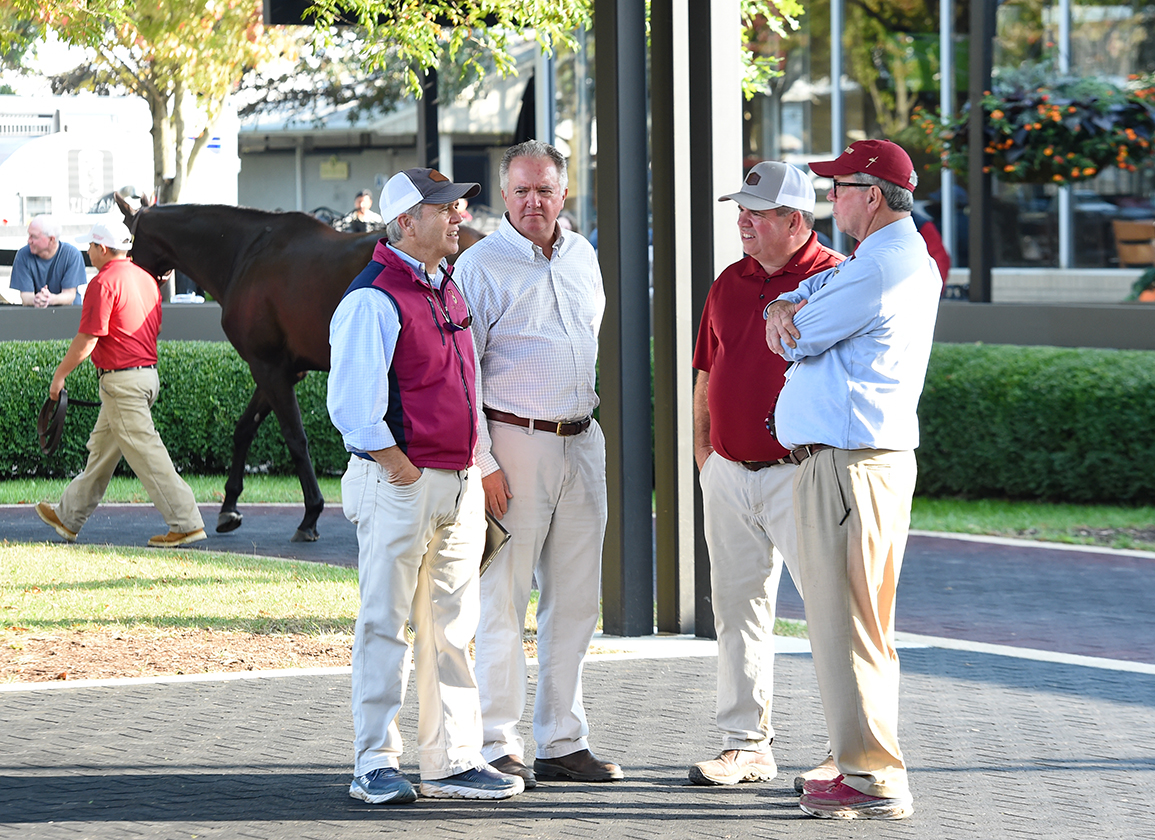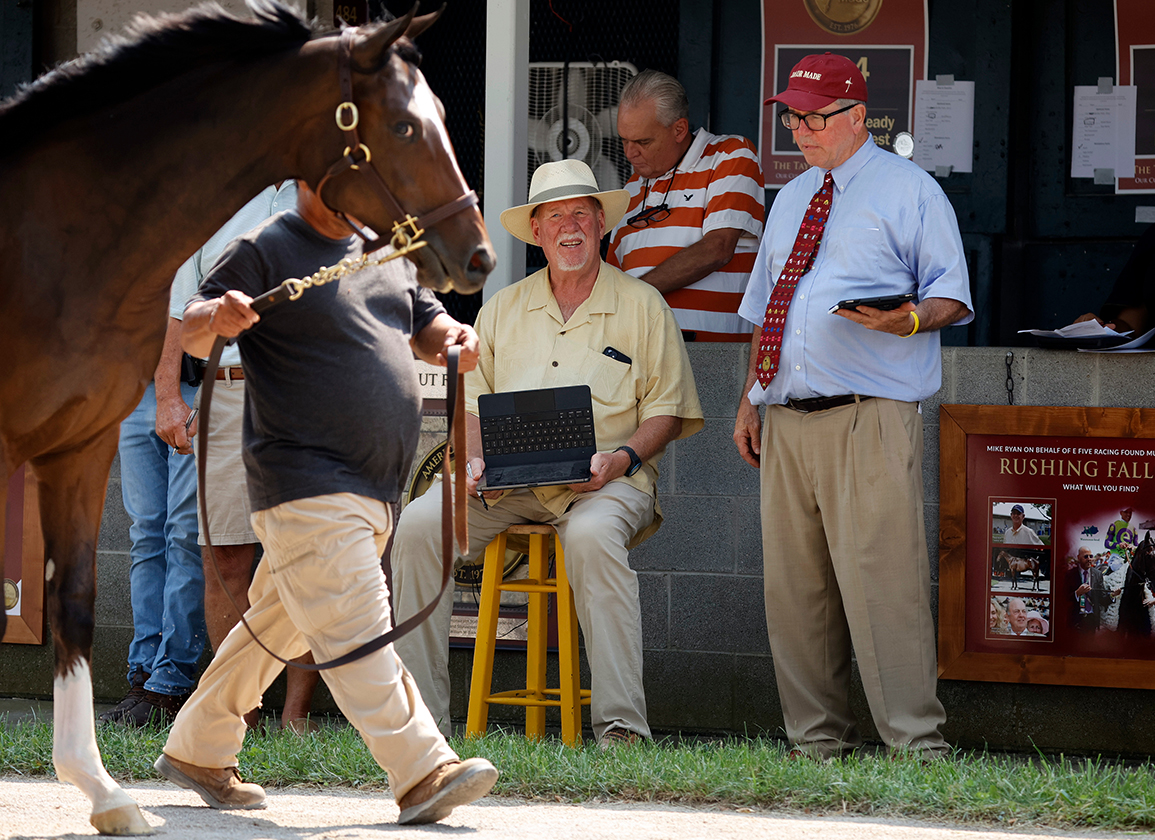The Classic season is over. A surface reading shows that Arrogate (Unbridled's Song), Keen Ice (Curlin), and Gun Runner (Candy Ride {Arg}) got the GI Kentucky Oaks, GI Kentucky Derby, and GI Preakness S. winners, respectively, from their first crops, and proven star sire Uncle Mo (Indian Charlie), who had a Derby winner from his first crop in 2016, sired the GI Belmont S. winner. Sometimes, however, what's between the lines is as important as what's on the page, and Taylor Made's Not This Time (Giant's Causeway), whose second-crop sons Epicenter and Simplification were major players in the run-up to the Classics and in the Derby and Preakness themselves, occupied that white space this season.
Epicenter, who won two Grade II Derby preps at Fair Grounds–the Risen Star S. and the Twinspires.com Louisiana Derby–was sent off as the Derby favorite and finished an admirable second. He returned in the Preakness as the race favorite and again finished second, this time with trouble and a ride that gave him way too much to do.
Simplification won the GII Fasig-Tipton Fountain of Youth S. at Gulfstream and was third in the GI Curlin Florida Derby. He was also in the Derby, finishing fourth, a neck ahead of subsequent Belmont S. winner Mo Donegal.
These two, both from Candy Ride mares, were joined by two other Not This Time 3-year-olds vying for spots in the Classics. In Due Time was second to Simplification in the Fountain of Youth, over Howling Time in ninth, who bounced back to finish second by a scant nose to Cyberknife (Gun Runner), the GI Arkansas Derby winner, in the GIII Matt Winn S. at Churchill a day after the Belmont S.
All told, Not This Time, with his oldest foals just four, is represented by 18 black-type winners, including two Grade I winners–the filly Just One Time won the GI Madison S. at Keeneland a month before the Derby, and Princess Noor was a top-level winner at two in 2020. Seven of the 18 are graded stakes winners.
This is an impressive haul for the half-brother to Lane's End's Liam's Map, more so because they were all conceived on a $15,000 stud fee. It's only the last two seasons that his stud fee has risen, to $40,000 (2021), $45,000 (the early part of this year), and $75,000 (later part of this year). The mares bred to him at higher fees will no doubt include some significantly better producers and racetrack performers than those covered his first four years, and they will include some mares Taylor Made has specifically handpicked for him by pedigree analysis. All of this is certain to elevate the stallion's stakes production in the coming years.
The broodmare sires of his seven graded winners are respectable enough, with dams by Candy Ride (two), Tapit, Speightstown, Smart Strike, Cape Town, and Wilko. However, the modest last sales prices of these mares tell the real story: stakes-placed Simply Confection (Candy Ride) sold for $80,000, in foal to Not This Time; Silent Candy (Candy Ride), a Grade III-placed stakes winner, made $130,000, in foal to Scat Daddy; non-winner Delightful Melody (Tapit) was a $65,000 RNA, in foal to Flameaway; Ida Clark (Speightstown), a winner of $25,580, sold for $60,000, in foal to Outwork; unraced Smart Jilly (Smart Strike) was a $70,000 2-year-old; unraced Running Creek (Cape Town) sold for $35,000, in foal to Latent Heat; and Grade III winner Sheza Smoke Show (Wilko) sold for $185,000, in foal to Not This Time.
The first graded winner for each of these mares was by Not This Time. In some cases, they were bred to high-class stallions before producing their graded winners.
Silent Candy, the dam of Epicenter, had an unraced colt by More Than Ready and a winner of $34,404 by Scat Daddy; Running Creek, the dam of Grade III winner Easy Time, had a Twirling Candy winner of $57,410 and a Pioneerof the Nile winner of $48,896; and Sheza Smoke Show, the dam of Princess Noor, had a Malibu Moon winner of $28,056, and an unraced Liam's Map.
Not This Time only raced at two, and he made just four starts, winning twice. However, he won the GIII Iroquois S. at Churchill by 8 3/4 lengths and next out was a neck second to Classic Empire in the GI Sentient Jet Breeders' Cup Juvenile at Santa Anita, 7 1/2 lengths ahead of third-place finisher Practical Joke. Classic Empire would go on to win the Arkansas Derby and Practical Joke the GI H. Allen Jerkens S. at Saratoga, so his form was obviously of the highest order and there's no telling what he might have accomplished had injury not ended his career. His half-brother Liam's Map was a multiple Grade I winner.
Not This Time entered stud at three and is an outstanding physical specimen, big and tall, and he made an impression with breeders right away by getting good-looking foals. Buyers responded in the sales ring, paying an average price of $76,833 for the 18 weanlings from his first crop that sold in 2018, with seven making $100,000 or more. From then on, he's been something of a sales sensation across the board vis a vis stud fee. Princess Noor, for example, made $1.35 million as a 2-year-old at OBS April in 2020.
In his case, looks translated to performance.
Black-type percentages
That Not This Time has already sired 18 black-type winners is impressive as it is on face value alone, but it's even more so as a percentage of named foals. These days, with popular stallions routinely covering more than 100 mares each year, a good stallion can be expected to get 5% black-type winners to foals, and for young horses with fewer crops racing, the percentages are even lower.
War Front leads all established Kentucky stallions with a ratio of 11.23%, followed by Tapit at 9.86%, Speightstown 9.77%, Into Mischief 8.56%, Medaglia d'Oro 8.36%, Curlin 8.29%, and Ghostzapper 7.89%.
Not This Time is next on the list behind Ghostzapper at 7.47%, ahead of Munnings at 7.15%, Quality Road 7.13%, Uncle Mo 6.95%, Constitution 6.80%, More Than Ready 6.73%, and Street Sense 6.67%.
You get the picture. Not This Time is right up there in the production of black-type winners with the best in the country, and he's the youngest of this group.
Among his own cohort, he's the leading third-crop sire, ahead of Laoban at 5.71%, Upstart at 4.07%, Hit It a Bomb 3.95%, Nyquist 3.18%, and Runhappy 3.04%.
Not This Time's first crop came to the races in the COVID year of 2020 when racing, as life, was disrupted, but there were clues then–at least by August, when I wrote here “Not This Time Leads Freshman Sires“–that he was going to be more than a flash in the pan. He was getting quality maiden special winners then and performing far above his stud-fee level, and that impression has turned into reality.
A stallion that can move up his mares to graded and listed levels–not to mention Classics contenders–at a $15,000 fee is one that can better withstand the drops in book quality from years two to four, and we're seeing this year that his second crop headed by Epicenter and the others noted is highly effective.
He is the real deal.
Sid Fernando is president and CEO of Werk Thoroughbred Consultants, Inc., originator of the Werk Nick Rating and eNicks.
The post Taking Stock: It’s High Time for This Stallion appeared first on TDN | Thoroughbred Daily News | Horse Racing News, Results and Video | Thoroughbred Breeding and Auctions.





